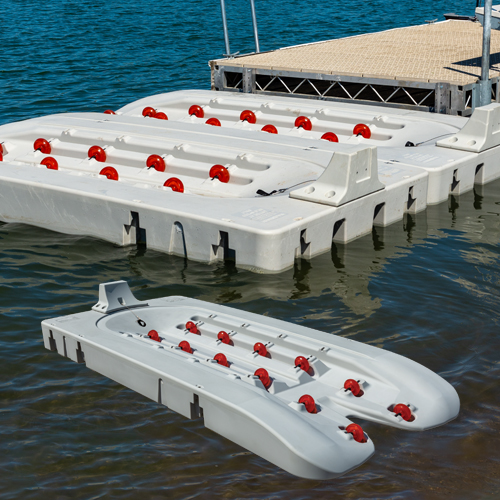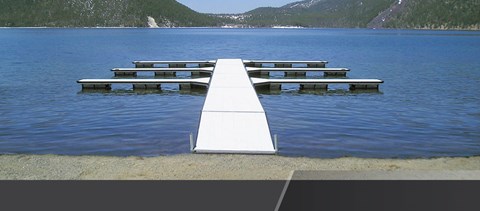Floating Docks: The Smart Option for Modern Waterfront Living and Leisure
Floating Docks: The Smart Option for Modern Waterfront Living and Leisure
Blog Article
Floating Docks: The Suitable Choice for Versatile Water Gain Access To
Floating docks existing an engaging service for a selection of water accessibility needs, supplying adaptability that transcends traditional mooring choices. Their capacity to adapt to changing water levels while guaranteeing stability and safety makes them particularly advantageous for both commercial and entertainment applications. Furthermore, the modular nature of floating docks helps with modification, dealing with specific demands. The nuances of setup and maintenance, alongside the variety of applications, call for a closer exam to totally value their possible benefits and implications for waterway gain access to strategies.
Advantages of Floating Docks
Floating docks offer various advantages that enhance water access for various applications. Their capability to drop and increase with altering water degrees makes them particularly helpful in atmospheres with fluctuating trends or seasonal variations. This adaptability makes sure that vessels can easily moor without concern for the water's deepness, offering a trustworthy system for recreational, business, and industrial usages.
Additionally, floating docks are usually constructed from resilient products that resist rust, making them appropriate for long-term use in marine environments. Their installment is commonly much less intrusive than traditional set docks, decreasing the ecological impact and facilitating quicker release (floating dock company). This flexibility enables easier relocation or reconfiguration according to user demands or ecological changes
Security is another crucial benefit; floating docks can provide steady access for people getting off or boarding from watercrafts and minimize the danger of crashes linked with unsteady surface areas. Moreover, they can be created to fit a range of accessories, such as fenders and cleats, enhancing functionality. Overall, floating docks stand for an effective option for improving water accessibility throughout diverse markets while advertising safety and security and environmental sustainability.

Kinds of Floating Docks
Different kinds of floating docks deal with various requirements and atmospheres, each designed with specific functions to enhance functionality. One of the most common types include modular docks, which contain interlocking sections that enable very easy modification and expansion. These docks are excellent for recreational usage, as they can be tailored to fit various watercraft sizes and water conditions.
An additional preferred option is the fixed floating dock, which continues to be anchored in location yet drifts with altering water degrees. dock company. This kind is especially suited for areas with minimal tidal changes, supplying steady gain access to for fishing or swimming. Additionally, there are drive-on docks, which feature a sloped design that enables boats to conveniently drive on and off, making them appropriate for personal boat and smaller sized vessels
For industrial applications, heavy-duty floating docks are available, built from strengthened products to stand up to significant lots and rough marine environments. Environmentally friendly floating docks make use of lasting products and layouts to minimize environmental influence, typically incorporating features like vegetation to sustain local wildlife. Comprehending the different sorts of floating docks guarantees that customers can select the most appropriate service for their specific requirements.
Setup Process Introduction
A successful installation of floating docks needs mindful preparation and interest to detail to make sure optimal efficiency and safety and security. The initial action entails assessing the site problems, consisting of water depth, present, and possible obstacles. This assessment informs the choice of the suitable dock products and style customized to the specific setting.
Following, obtaining needed licenses is essential, as numerous jurisdictions have laws relating to construction on water bodies. The installment can proceed when permissions are protected. Begin by preparing the structure, which might include anchoring systems or pilings tailored to the dock type and regional problems.
Adhering to the structure setup, set up the dock sections according to manufacturer specifications. Make sure that all parts are securely dig this secured and lined up to hold up against ecological stress and anxieties. Position the dock in the assigned area, ensuring it is degree and stable.

Upkeep Tips and Ideal Practices
After the setup procedure is full, ongoing maintenance plays a vital function in ensuring the durability and performance of floating docks. Routine assessments need to be conducted to recognize any kind of indicators of deterioration, damage, or wear - floating dock builder. Look for any loose installations, fractures, or splitting up in the dock areas, as these can jeopardize structural stability
Cleaning up the dock is important to remove particles, algae, and other accumulation that can affect its appearance and safety. Utilize a gentle stress laundry periodically to keep cleanliness without causing damages to the surface. In addition, applying a protective sealant every couple of years can help improve long life and withstand ecological wear.
Take notice of the mooring lines and anchors, ensuring they are secure click here for info and complimentary from corrosion. Change any type of abject components without delay to prevent threats. Seasonal changes may additionally be necessary; throughout severe weather, repositioning or strengthening the dock can stop damages.
Applications for Floating Docks
Floating docks serve a multitude of applications, providing to both business and recreational needs. In entertainment setups, they offer seamless accessibility to rivers for tasks such as boating, angling, and swimming. Their adjustable nature enables installation in differing water degrees, guaranteeing stable and safe gain access to no matter tidal changes.
Commercially, floating docks are vital for marinas and beachfront organizations. They help with the docking of vessels, enabling reliable filling and unloading of items. Their modular design permits very easy growth or reconfiguration to suit transforming business demands, making them ideal for boat leasings, scenic tour procedures, or fishing charters.
Additionally, floating docks are used in ecological applications such as marine study and environment remediation. They can work as systems for clinical studies, checking water top quality, or conducting wildlife surveys without disturbing sensitive environments.
In commercial contexts, floating docks are used in building tasks, providing access to hard-to-reach locations for equipment and personnel. Their adaptability, durability, and minimal influence on the atmosphere make them an ideal choice for a vast array of applications, enhancing both capability and access in different water-based environments.
Conclusion
In verdict, floating docks represent an optimal remedy for diverse water accessibility needs, owing to their flexibility, longevity, and modular design. These frameworks facilitate safe mooring for different applications while reducing ecological impact during installation. The minimized maintenance requirements better boost their usefulness. Floating docks offer as a valuable asset for entertainment, industrial, and ecological tasks, making sure dependable access to waterways and promoting sustainable methods in aquatic environments.
Floating docks present an engaging solution for a variety of water gain access to needs, supplying flexibility that transcends standard mooring options.Floating docks deal many benefits that enhance water access for numerous applications. On read review the whole, floating docks stand for an efficient option for improving water access throughout diverse fields while advertising safety and ecological sustainability.
One more preferred option is the stationary floating dock, which stays secured in place but floats with changing water levels.In conclusion, floating docks represent an optimum remedy for varied water gain access to needs, owing to their versatility, toughness, and modular design.
Report this page